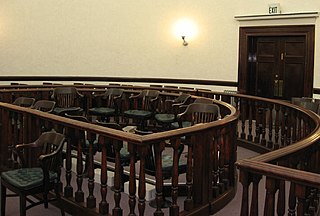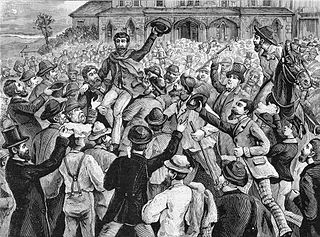Related Research Articles
In jurisprudence, double jeopardy is a procedural defence that prevents an accused person from being tried again on the same charges following an acquittal or conviction and in rare cases prosecutorial and/or judge misconduct in the same jurisdiction. Double jeopardy is a common concept in criminal law. In civil law, a similar concept is that of res judicata. Variation in common law countries is the peremptory plea, which may take the specific forms of autrefois acquit or autrefois convict. These doctrines appear to have originated in ancient Roman law, in the broader principle non bis in idem.

A jury trial, or trial by jury, is a legal proceeding in which a jury makes a decision or findings of fact. It is distinguished from a bench trial in which a judge or panel of judges makes all decisions.

A jury is a sworn body of people (jurors) convened to hear evidence and render an impartial verdict officially submitted to them by a court, or to set a penalty or judgment.
Jury nullification (US/UK), jury equity (UK), or a perverse verdict (UK) occurs when the jury in a criminal trial gives a not guilty verdict regardless of whether they believe a defendant has broken the law. The jury's reasons may include the belief that the law itself is unjust, that the prosecutor has misapplied the law in the defendant's case, that the punishment for breaking the law is too harsh, or general frustrations with the criminal justice system. Some juries have also refused to convict due to their own prejudices in favor of the defendant. Such verdicts are possible because a jury has an absolute right to return any verdict it chooses.

In common law jurisdictions, an acquittal means that the prosecution has failed to prove that the accused is guilty beyond a reasonable doubt of the charge presented. It certifies that the accused is free from the charge of an offense, as far as criminal law is concerned. The finality of an acquittal is dependent on the jurisdiction. In some countries, such as the United States, an acquittal prohibits the retrial of the accused for the same offense, even if new evidence surfaces that further implicates the accused. The effect of an acquittal on criminal proceedings is the same whether it results from a jury verdict or results from the operation of some other rule that discharges the accused. In other countries, like Australia and the UK, the prosecuting authority may appeal an acquittal similar to how a defendant may appeal a conviction — but usually only if new and compelling evidence comes to light or the accused has interfered with or intimidated a juror or witness.

In law, a verdict is the formal finding of fact made by a jury on matters or questions submitted to the jury by a judge. In a bench trial, the judge's decision near the end of the trial is simply referred to as a finding. In England and Wales, a coroner's findings used to be called verdicts but are, since 2009, called conclusions.

Judge Judy is an American arbitration-based reality court show presided over by former Manhattan Family Court Judge Judith Sheindlin. The show featured Sheindlin as she adjudicated real-life small-claims disputes within a simulated courtroom set. Prior to the proceedings, all involved parties signed arbitration contracts agreeing to Sheindlin's ruling. The show aired in first-run syndication. As it was during its active years in production, it continues to be distributed by CBS Media Ventures in syndication, now in reruns that still draw notably high ratings.
Not proven is a verdict available to a court of law in Scotland. Under Scots law, a criminal trial may end in one of three verdicts, one of conviction ("guilty") and two of acquittal.

Judith Susan Sheindlin, known professionally as Judge Judy, is an American court-show arbitrator, media personality, television producer, philanthropist, and former prosecutor and Manhattan family court judge.

Judge Joe Brown is an American arbitration-based reality court show starring former Shelby County, Tennessee criminal court judge Joseph B. Brown. The series premiered on September 14, 1998 and ran through the 2012–13 television season for a total of fifteen seasons. Joe Brown was the second highest paid daytime television personality behind Judge Judy during the time the show was running.

The People of the State of California v. Orenthal James Simpson was a criminal trial in Los Angeles County Superior Court starting in 1994, in which O. J. Simpson, a former National Football League (NFL) player, broadcaster and actor, was tried and acquitted for the murders of his ex-wife Nicole Brown Simpson and her friend Ronald Goldman. The pair were stabbed to death outside Brown's condominium in the Brentwood neighborhood of Los Angeles on the night of June 12, 1994. The trial spanned eleven months, from November 9, 1994 to October 3, 1995.
The Jeanine Nicarico murder case was a complex and influential homicide investigation and prosecution in which two men, Rolando Cruz and Alejandro Hernandez, both Latinos, were wrongfully convicted of abduction, rape and murder in 1985 in DuPage County, Illinois. They were both sentenced to death. The case was scrutinized during appeals for being weak in evidence.
These are first-run syndicated television shows that air on commercial broadcast stations in a significant number of markets. If it has only aired in a few markets, it is not significantly important enough to be placed on this list. Note that shows listed here do not necessarily air in every market.

Caylee Marie Anthony was an American toddler who lived in Orlando, Florida, with her mother, Casey Marie Anthony, and her maternal grandparents, George and Cindy Anthony. On July 15, 2008, she was reported missing in a 9-1-1 call made by Cindy, who said she had not seen Caylee for 31 days. According to what Cindy told the operators, Casey had given varied explanations as to Caylee's whereabouts before eventually saying she had not seen Caylee for weeks. Casey later called the police and falsely told a police dispatcher that Caylee had been kidnapped by a nanny on June 9. Casey was charged with first-degree murder in October 2008 and pled not guilty.
The Double Jeopardy Clause of the Fifth Amendment to the United States Constitution provides: "[N]or shall any person be subject for the same offence to be twice put in jeopardy of life or limb..." The four essential protections included are prohibitions against, for the same offense:
A court show is a broadcast programming subgenre comprising legal dramas and reality legal programming. Court shows present content mainly in the form of legal hearings between plaintiffs and defendants presided over in one of two formats: scripted/improvised with an actor portraying a judge; or an arbitration-based reality format with the case handled by an adjudicator who was formerly a judge or attorney.
A citizen's right to a trial by jury is a central feature of the United States Constitution. It is considered a fundamental principle of the American legal system.

Lauren Lake's Paternity Court is a nontraditional court show in which family lawyer and legal analyst Lauren Lake heard and ruled on paternity cases and rendered DNA test results.
Colten Boushie was a 22-year-old Indigenous man of the Cree Red Pheasant First Nation who was fatally shot on a rural Saskatchewan farm by its owner, Gerald Stanley. Stanley stood trial for second-degree murder and for a lesser charge of manslaughter, but was ultimately acquitted in February 2018.
State of Minnesota v. Derek Michael Chauvin was an American criminal case in the District Court of Minnesota in 2021. Former Minneapolis police officer Derek Chauvin was tried and convicted for the murder of George Floyd, which occurred during an arrest on May 25, 2020, and led to global protests over racial injustice and police brutality. A 12-member jury found Chauvin guilty of unintentional second-degree murder, third-degree murder, and second-degree manslaughter. It was the first conviction of a white police officer in Minnesota for the murder of a black person.
References
- ↑ "Judge gives up gig in Brooklyn for TV show, "Hot Bench," produced by Judge Judy". New York Daily News. January 23, 2014.
- ↑ "Paternity Court: About the Show". Archived from the original on 2018-12-17. Retrieved 2018-12-17.
- ↑ "About — The People's Court".
- ↑ "Exclusive Interview: Julie Strain". October 10, 2002.